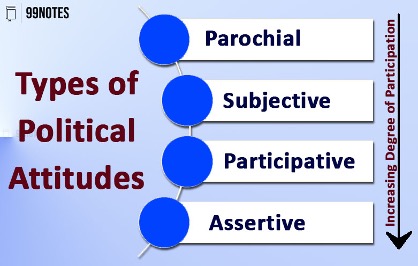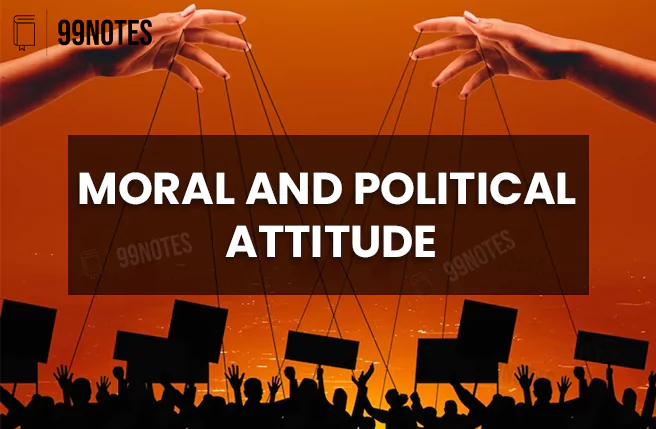Moral and political attitude
Attitude is the predisposition of a person to act towards a stimulus. We have already discussed various characteristics, dimensions and types of attitudes in the previous article.
In this article, we shall understand types of attitudes, including Moral and Political attitudes, which are important from the perspective of the UPSC Civil Services syllabus.
Moral Attitude:
Moral attitudes are attitudes with a moral foundation. We’ve already seen that morality refers to the set of principles that help individuals to identify between right and wrong.
Thus, those attitudes that are deeply rooted in moral conviction and are inspired by an individual’s ultimate sense of right and wrong are moral attitudes. They are a strong predictor of how a person may act or pass a social judgement. These are much stronger than merely ‘moral beliefs’.
Moral attitudes are determined more by environmental and socialization factors. It is shaped by family, school, religion, profession and personal experiences.
Characteristics of Moral Attitudes
- Moral attitudes are stronger and more resistant to change than other attitudes. The reason is moral attitudes have a deep-seated moral basis, which forms a part of the character of the person that gives them more excellent resilience.
- Moral attitudes are more accessible in memory and are more physiologically enlivened. Moral attitudes are experienced with a greater sense of importance.
- They encourage quick and intuitive judgments and are associated with greater emotional arousal when violated.
- For example, suppose someone believes that same-sex marriage is right because it upholds the fundamental human rights of an individual. In that case, they are more likely to participate in any movement supporting same-sex marriages. This is a reflection of their moral attitude towards same-sex marriages.
Implication of Moral Attitude:
Our actions also affect our moral attitudes in both negative and positive ways.
Negative Implications of Moral Attitudes:
If an act that harms society is justified by individual morality, it becomes tough to change such an attitude and can do great harm. For example:
- In Hitler’s concentration camps, guards made to engage in cruel acts may be initially uncomfortable but later justify their behaviour.
- Israel-Palestine conflict: In the present times, it may be argued that by engaging in discriminatory acts towards each other (like differential access to water and other resources), Israel and its supporters have started believing that the ‘sleazy, corrupt, and inferior Orientals’ deserve it and that any degree of hostility towards even the ordinary citizen of Palestine is justified while targeting terror groups like Hamas. The expulsion of the enemies is moral, ethical, and ‘good’.
Thus, a moral justification for a harmful act degrades the society.
Fortunately, the reverse is also true. Positive interracial behaviour has also been found to reduce racial prejudice.
Positive impact of Moral attitudes
Moral attitudes are often rooted in ‘conscience’. They prevent an individual from acting ‘immoral’ or in a corrupt way.
- Importance in private life: For example, a person brought up in Indian culture might never consider old parents to be an economic burden and take care of them because it is a moral duty.
- Importance in Bureaucracy and Politics: Voice of conscience, which is rooted in individual morality, often acts as the first line of defence against corruption. For example, a public officer might consider the service as a moral duty and thus always remain duty-bound.
In crux, we can say that in the hierarchy of values, moral values are always supreme. Values like goodness, truthfulness, humility, compassion, forgiveness, etc, are always revered more than values like beauty or wealth. Attitudes rooted in these values are moral attitudes and have greater influence over individual actions.
Political Attitude:
A Political attitude is an attitude that someone holds towards any political ideology. This refers to the outlook of an individual/group with respect to political persons, events, institutions and issues in the public domain.
The term ‘political’ refers to anything related to public affairs. A political attitude thus represents the predisposition of a person towards a perceived ideal position on matters of public policy.
In practical terms, it determines one’s interest or lack of interest in political persons and parties and the likelihood of participating in political activity like casting votes, contesting elections, etc.
Factor affecting political attitude:
There are many factors that influence the formation of political Attitudes in people.
- Family: Families have an enduring influence on the political opinions of individuals through the process of socialization. Family not only shapes political attitudes with respect to parties and policies they favour but also determines how likely a person is to join political activities like voting and politics itself.
For example, In India, elders often decide which political ideology or party should be supported. Similarly, in political families, the younger generation tends to join the same political party as their parents.
- Age: Generally, Older people are more conservative and Younger generations are more liberal/radical. For example, the emergence of political parties like HRA and HSRA in the Indian freedom struggle is a perfect example of young and old conflict. The youth in the 1930s supported young leaders of HRA, including Bhagat Singh, whereas older leaders under the leadership of Gandhi adopted a moderate approach to struggle.
- Social Identity: Socio-cultural norms that involve an individual’s religion, region, caste, and other such ethnic identities. Identity-based politics is the best example of how socio-cultural identities influence political attitudes.
For example, In India, it is generally said that people don’t cast their vote; rather, they vote for their caste. This is because people believe that their caste, language and such identity-based parties will invariably work for their interest.
- Socio-economic status: Socio-economic considerations also influence political attitudes. For example, Industrial workers are often aligned towards communist/socialist ideology. They will vote for a party promising to get subsidized food, electricity, and fertilizer. On the other hand, business classes will generally be aligned towards capitalist ideology.
- Education: Educational institutions provide a worldview that inevitably shapes the political attitudes of an individual. Especially at a young age, schools transmit the values and play a crucial role in shaping their attitude about the unwritten rules of the game of politics. Further, colleges act as a cradle of politics where individuals have their first experience with student politics.
For example, a Chinese student may find Indian democracy repulsive because he/she has been taught that Communist ideology is best.
- Religion: Often, an individual has a tendency towards those actions which promote religious interests. In India, we have religion-based parties like Akali Dal, AIMIM, etc, which mobilize people based on subtle religious appeals. Even candidates from mainstream parties have religious leanings.
- Moral Attitudes: Sometimes, moral attitude predicts political attitudes. For example, devout Christians are more likely to vote for the Republican party in the USA since Republicans are opposed to same-sex marriage.
- Historical factor: History hugely determines the political attitude of people towards political objects. For example, staunch supporters of the extreme right-wing in Ancient India cite history for creating an “Akhand-Bharat”.
- Geographical factor: People belonging to different geographies have different issues, and thus, their political attitudes differ. There is a general difference between the political attitude of the citizens living in the North Eastern region and the rest of India.
For example, In northeast India, political issues are based on schedule status, inner-line permits, separatist tendencies, etc. The hill states have different problems, such as inadequate infrastructure. Border states have different issues, such as infiltration and illegal immigrants. People from arid regions have different problems, such as environmental challenges, etc.
- Social media: In the age of the digital era, social media and mainstream media have a greater effect on people’s attitudes towards political objects. The debates, sensationalization of political leaders, and fake news phenomena lead to formation as well as change in people’s political attitudes.
For example, the recent Cambridge Analytica case highlighted how citizens’ data could be used for micro-targeting individuals and changing attitudes towards political parties and leaders.
Types of Political Attitude:
On the basis of people’s role and the input they provide in the political processes theoretically, there are 4 types of political attitudes that people have. They are:
- Parochial Type: People with parochial attitudes have little or no interest in political processes, so they don’t participate in political exercises like voting, For example, nomadic tribal groups across India fall under this category.
- Subjective Type: People with subjective political attitudes have a partially active role in the political processes. They engage with the government of the day for a few purposes, like participation in voting and utilization of rights provided to them, etc.
- Participative Type: Participative attitude provides for a fully active role, and thus, these people ensure that not only their rights but also their duty of holding political objects accountable are upheld. For example, in India, people with a participative attitude put their opinion on policy draft that is given by the government on a public platform. RTI activists are also prominent examples of participative attitudes.
- Assertive Type: In this type, emotions (affective component) override the cognitive component. For example, cow vigilantism in India.
Other classifications of Political attitudes
Radical, Liberal and Conservative attitudes
In most cases, an individual’s political attitude is also based on the political ideology he follows, which ranges from extreme left to extreme right. In the centre lies the liberal ideology. The supporters of liberal ideology are in favour of principles of equality, democracy, and individual rights in laws and policies.
To the extreme left of the liberal ideology lies people with radical political attitudes who are extremely dissatisfied with the existing government. To the right of the liberal attitude is conservatism, and people with this attitude favour the status quo as they doubt that any change will result in something better in the existing political structure.
Democratic versus Bureaucratic attitudes
‘Bureaucratic’ attitude refers to the tendency of a public officer to follow the laws, rules and norms in true letter and spirit, regardless of the current public interest.
- The problem of the Bureaucratic attitude: Often, public interest is ignored. For example, say a reserve forest is being used by local communities for fuel and fodder, which is illegal under law. If a Public officer enforces the law strictly, the livelihood of the local communities would be severely impacted.
- Importance of Bureaucratic Attitude: Strict adherence to laws prevents any corruption or careless mistake by the bureaucracy. For example, strictly not allowing grazing in reserve forests would prevent the degradation of the forest land due to over-grazing.
‘Democratic’ attitude refers to the tendency of a person to act democratically or to support those positions that are in general public interests, regardless of law, norms or morals.
- Problem of Democratic attitude: The real job of a bureaucrat is to implement the law, not to interpret the law, which is the job of a judge. Being overly democratic can mean a certain degree of lawlessness.
- Importance of Democratic attitude: Often, laws provide a certain degree of flexibility to a bureaucrat. Democratic attitude allows laws to be interpreted in favour of the public interest, as far as possible.
For example, suppose there are illegal slums in a city. If a civil servant goes by law and forcefully removes all the illegal settlements, it is a bureaucratic attitude. However, if the civil servant chooses not to enforce the law and tries to resolve the matter through an amicable solution as far as possible, it is a democratic attitude.
Thus, people supporting different political ideologies have different attitudes towards political objects of society.




